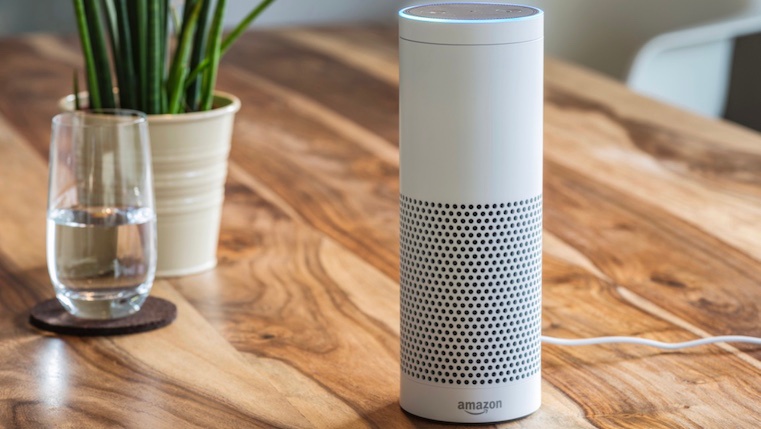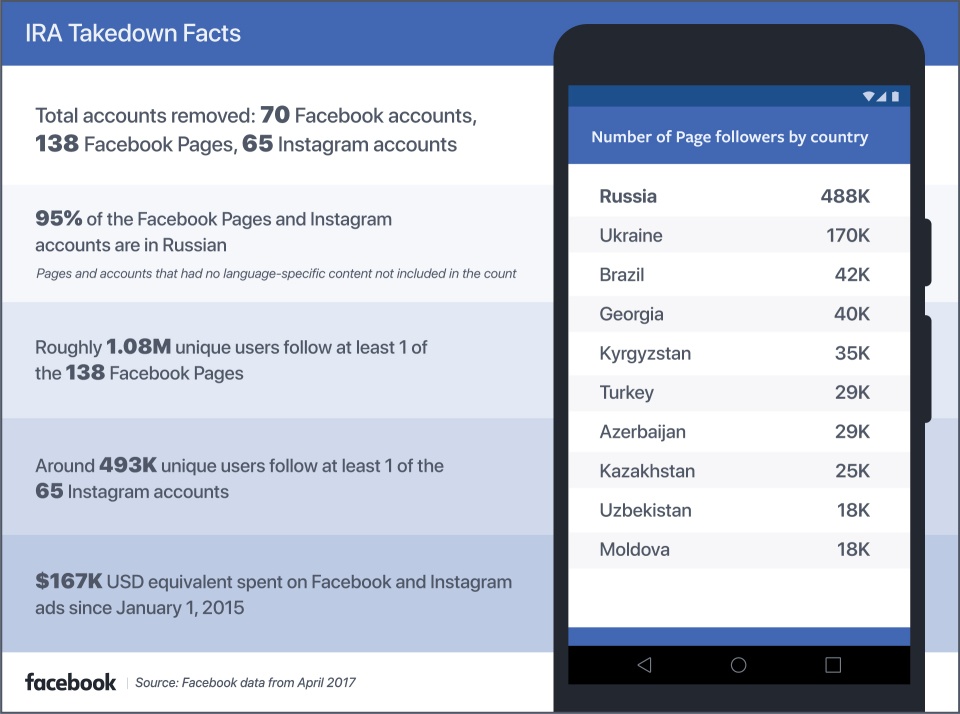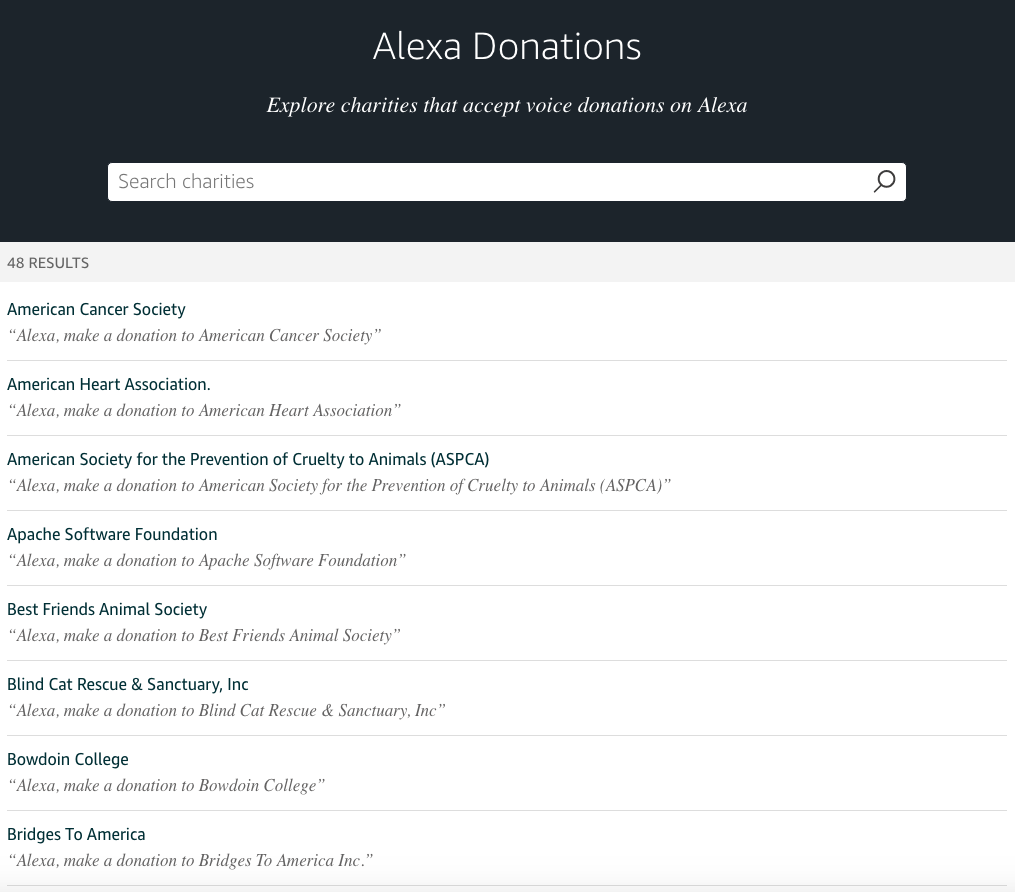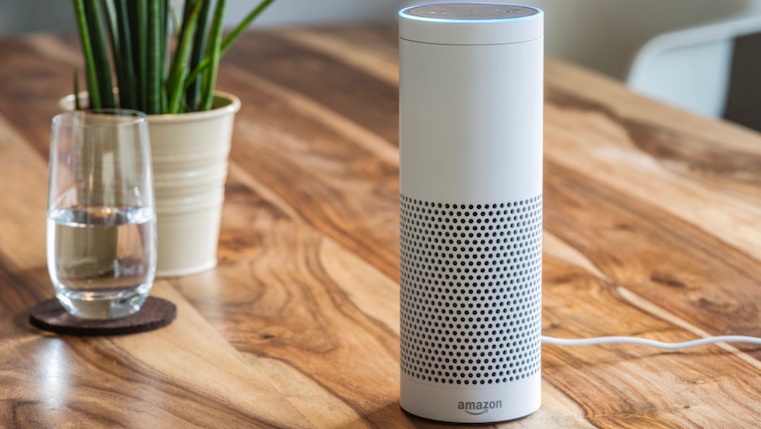And, get this: It's not all about Facebook. It's our Wednesday tech news roundup, and we're breaking it down. "Alexa, Make a Donation" On Monday, it was revealed that Amazon Echo Users can now donate to 40 charities through Amazon Pay: a service, much like Apple Pay or Google Pay, that lets people use payment methods already associated stored in their Amazon accounts to purchase goods and services -- and now, to make donations. To that end, organizations that receive donations through Alexa will also receive the user's name, address, and email address, but not his or her credit card information. Data Leaks Abound Facebook wants to make one thing clear to users: The ongoing situation with Cambridge Analytica was not a data leak. And despite Gustavison verifying the problem soon thereafter and saying the company was working on a fix, eight months later, Houlihan discovered that the site was not only continuing to leak data, but that the estimated seven million jeopardized customer records could also be easily indexed and crawled by automated tools. Grindr has since issued a statement to BuzzFeed indicating that it will stop sharing medical test information from user profiles with these third-party firms -- while also calling the negative response "a misunderstanding of technology," according to the app's Chief Security Officer Bryce Case, by the people who were unhappy to learn of this activity. Facebook has continued to respond to the fallout from allegations that personal user data was misused by analytics and profiling firm Cambridge Analytica, with announcements made last week that the company would be limiting the data available to advertisers on its platform. Read full story >> While Facebook was dominating many tech news headlines in March, Google was quietly having a busy month of its own. Read full story >> Last week, we reported on changes that visual-content-sharing app Instagram would be making to its algorithm, with the possible introduction of a "New Posts" feature and more.

Welcome one, welcome all to Wednesday — the day that marks not just the week’s halfway point, but another edition of “Unriddled”: the HubSpot Marketing Blog’s mid-week digest of the tech news you need to know.
This week, we continue to wade through the very crowded pool of tech news items to help you decrypt what’s happening in this vast, often complex sector. And, get this: It’s not all about Facebook.
It’s our Wednesday tech news roundup, and we’re breaking it down.
Unriddled: The Tech News You Need
1. An IRA Purge From Facebook
Yesterday afternoon, Facebook Chief Security Officer Alex Stamos issued a statement indicating that the company had removed 70 Facebook and 65 Instagram accounts, in addition to 138 Facebook Pages, that were controlled by the Russia-based Internet Research Agency (IRA). The announcement noted that many of these Pages ran ads that have also been removed from Facebook.
Roughly 95% of the Pages with content were in Russian, indicating that these pages were targeted toward Russia residents or people who speak the language in neighboring nations.
According to Stamos, the decision to remove these Pages had little to do with the content itself — and everything to do with the fact that they were controlled by the IRA, which “has repeatedly used complex networks of inauthentic accounts to deceive and manipulate people who use Facebook, including before, during and after the 2016 U.S. presidential elections,” he wrote. “It’s why we don’t want them on Facebook.”
Users can expect a further explanation from Facebook in the coming weeks, Stamos said. The company is looking to update its Help Center so people can find out if they liked any of these Pages.

2. “Alexa, Make a Donation”
On Monday, it was revealed that Amazon Echo Users can now donate to 40 charities through Amazon Pay: a service, much like Apple Pay or Google Pay, that lets people use payment methods already associated stored in their Amazon accounts to purchase goods and services — and now, to make donations.
To make donations through Alexa, users need to have such a valid payment method set up in their Amazon accounts, and have voice purchasing enabled. And in order to prevent others from making unwanted donations, users can set up a four-digit voice confirmation code, which can be done through the voice purchasing settings.
It’s an interesting new feature for Amazon, and not the first that allows shoppers to use its technology to make charitable donations. In 2013, the company launched Amazon Smile, which lets users pick a charity that will receive 0.5% of what they pay for certain, eligible products.

But with the introduction of this Alexa skill, it allows users to make more spontaneous or impromptu donations just through an Alexa command — without reaching for their wallets or filling in several information fields.
To that end, organizations that receive donations through Alexa will also receive the user’s name, address, and email address, but not his or her credit card information. So, while there’s a chance that you’ll receive follow-up communication from the organization you donated to, the payment information itself is supposed to be secure.
3. Data Leaks Abound
Facebook wants to make one thing clear to users: The ongoing situation with Cambridge Analytica was not a data leak. Rather, it was the misuse of data — collected by an app developer as was allowed by Facebook at the time — by an analytics and profiling firm that never should have obtained information in the first place.
Keep that distinction in mind — because over the past several days, more than one consumer platform has experienced actual data leaks.
MyFitnessPal
One of them was MyFitnessPal: a free online calorie tracking site that’s owned by fitness apparel company Under Armour, which announced last week that the site had experienced a data beach impacting up to 150 million accounts. The data did not include information like Social Security or credit card numbers, according to the company’s statement, but was instead limited to things like usernames, email addresses, and hashed passwords (the kind that’s encrypted with something called bcrypt).
The second was a data leak from fast-casual restaurant chain Panera that included information like customer names, email and mailing addresses, dates of birth, and the last four digits of their credit card numbers. And according to information security blogger Brian Krebs, Panera knew of this leak for eight months before it addressed it.
It all began in August 2017 when security researcher Dylan Houlihan alerted Panera that customer data was leaking from its site — which according to emails supplied to Krebs, led to Panera’s director of information security Mike Gustavison largely writing off the report as a scam. And despite Gustavison verifying the problem soon thereafter and saying the company was working on a fix, eight months later, Houlihan discovered that the site was not only continuing to leak data, but that the estimated seven million jeopardized customer records could also be easily indexed and crawled by automated tools.
Since Krebs first reported the leak on Monday, Panera has issued statements indicating that it has fixed the problem — but several sources have said that the “fix” barely goes beyond requiring a valid user login to view these records (whereas before, anyone with the correct link to them could view them). Others have also reported…

COMMENTS